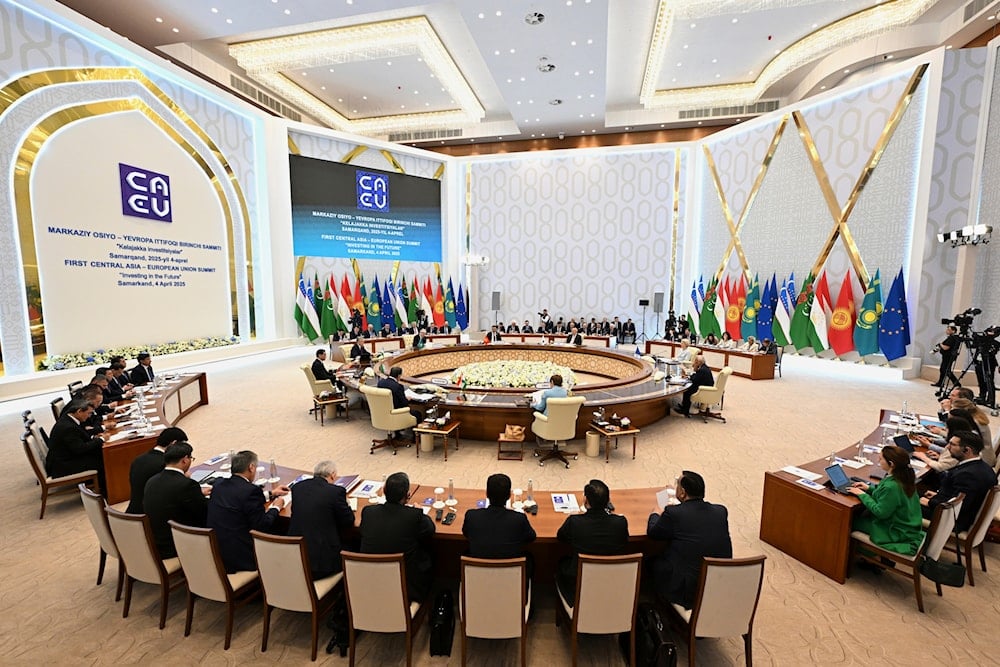EU announces 'new era' in relations with Central Asia
The European Union marked the start of a "new era" in its relationship with Central Asia during a summit in Uzbekistan, aiming to expand its influence amid growing competition from Russia and China.
-

This photo released by Uzbekistan's Presidential Press Office offers a view of the first summit between the leaders of the EU and the five countries of Central Asia in Samarkand, Uzbekistan, on April 4, 2025. (Uzbekistan's Presidential Press Office via AP)
The European Union declared the beginning of a “new era” in its relationship with Central Asia on Friday during a major summit in Uzbekistan, as it seeks to expand its influence in the region amid competition from Russia and China.
The war in Ukraine has hastened Central Asia’s shift away from Moscow, creating space for Western and Eastern powers to assert themselves.
Leaders from Kazakhstan, Kyrgyzstan, Tajikistan, Turkmenistan, and Uzbekistan met with top EU officials in Samarkand, a historic Silk Road city long known for its role in linking East and West through trade and diplomacy.
Central Asia, abundant in natural resources and strategically located at the crossroads of Afghanistan, Iran, China, and Russia, also plays a key role in regional security and is vulnerable to climate change. "This is the start of a new era in our ancient friendship," EU chief Ursula von der Leyen told Central Asian leaders.
European Commission President Ursula von der Leyen and European Council head Antonio Costa visited Uzbekistan amid global economic tremors triggered by Trump’s tariff offensive and as the war in Ukraine entered its fourth year. "We are at another turning point. New global barriers arise, investments are being redirected, powers around the world are carving up new spheres of influence," von der Leyen said.
"Reliable partners have never been so important. We want to explore new avenues," she said, calling for a "strategic partnership" with the region.
'Honey pot for global players': Von der Leyen
These resources are a "honey pot for global players," von der Leyen said. She stressed that the landlocked region has an abundance of uranium, cobalt, copper, and other essential materials, adding that "Europe's offer is different," promising to help develop local industries.
Von der Leyen said Brussels wanted to help Central Asia become a "clean energy powerhouse", announcing that Europe's satellites could bring the internet to areas where it is scarce. "It would give direct access to high-speed internet without your neighbours acting as gatekeepers," she said, in an apparent reference to Russia, which tightly controls information.
'Not going to preach'
Central Asia is keen on attracting foreign investment. That said, Uzbek President Shavkat Mirziyoyev pointed out that the notable progress in relations among the five regional nations in recent years made this summit achievable.
"Only seven or eight years ago, borders between the countries were closed. There was no trade, no transit, business... Relations were frozen," he remarked, adding, "Nobody would be able to even imagine that in the near future we could stand together to represent the region in talks with European leaders."
According to reports, Mirziyoyev took power in Uzbekistan after the death of Islam Karimov in 2016 and has since initiated reforms, opening up the country after years of isolation. However, human rights organizations have raised concerns about the region's worsening human rights situation.
Despite concerns from NGOs, human rights were not expected to be a major focus during the talks, an EU official told AFP on condition of anonymity. "We're not going there to preach, but we are going to make our concerns known, to work with them, to have a dialogue," the official stated.
Sanctions
Despite the EU's ambitions, Russia and China remain formidable competitors. The war and sanctions against Russia are expected to be discussed at the talks, according to an EU official. Central Asia has become a key route for re-exporting Western goods to Russia, bypassing sanctions.
Brussels wants the region to take stronger action to curb this flow, aiming to maintain pressure on Moscow while Trump fosters closer ties with the Kremlin.
That said, the EU official noted that while Central Asian countries have shown "willingness" and made "some progress," they expect "a lot more" from their partners.

 4 Min Read
4 Min Read








